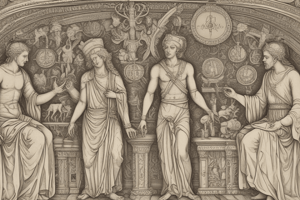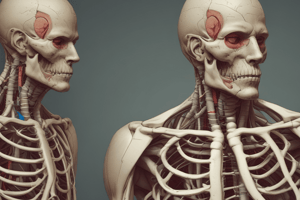Podcast
Questions and Answers
What major advancement did Andreas Vesalius contribute to the understanding of human anatomy?
What major advancement did Andreas Vesalius contribute to the understanding of human anatomy?
- Performed dissections on human cadavers (correct)
- Discovered blood circulation
- Established the concept of venous and arterial blood
- Published detailed anatomical drawings of animal species
Which figure is known for disputing Claudius Galen's ideas regarding bodily humours?
Which figure is known for disputing Claudius Galen's ideas regarding bodily humours?
- Ambroise Paré
- Andreas Vesalius (correct)
- William Harvey
- Martin Luther
What impact did the Protestant Reformation have on the field of medical science?
What impact did the Protestant Reformation have on the field of medical science?
- It enabled the spread of new scientific ideas facilitated by the printing press. (correct)
- It focused solely on religious studies rather than medical advancements.
- It limited the spread of scientific ideas across Europe.
- It resulted in the development of new surgical equipment.
What was William Harvey's key discovery related to the cardiovascular system?
What was William Harvey's key discovery related to the cardiovascular system?
What was a significant limitation in Claudius Galen's understanding of physiology?
What was a significant limitation in Claudius Galen's understanding of physiology?
Which invention was pivotal in spreading scientific ideas during the Renaissance?
Which invention was pivotal in spreading scientific ideas during the Renaissance?
Ambroise Paré is best known for his contributions to which area of medicine?
Ambroise Paré is best known for his contributions to which area of medicine?
What concept regarding blood did Galen incorrectly establish?
What concept regarding blood did Galen incorrectly establish?
Which key figure's ideas were essential in moving away from Galen's teachings during the Renaissance?
Which key figure's ideas were essential in moving away from Galen's teachings during the Renaissance?
How did the Renaissance impact the study of human anatomy?
How did the Renaissance impact the study of human anatomy?
What method was developed to halt bleeding during medical procedures?
What method was developed to halt bleeding during medical procedures?
What was a primary advantage of the printing press in the context of medical texts?
What was a primary advantage of the printing press in the context of medical texts?
Which innovation replaced body fluids with plastic for preservation?
Which innovation replaced body fluids with plastic for preservation?
What significant impact did anatomical visualizations have?
What significant impact did anatomical visualizations have?
What were barber surgeons known for practicing?
What were barber surgeons known for practicing?
How has modern anatomy been characterized as an evolving field?
How has modern anatomy been characterized as an evolving field?
What critical advancement does the Visible Human Project offer?
What critical advancement does the Visible Human Project offer?
What role did historical context play in the development of advances in dissection and anatomy?
What role did historical context play in the development of advances in dissection and anatomy?
What did printers eliminate that significantly improved medical publishing?
What did printers eliminate that significantly improved medical publishing?
Which of the following best describes the work of Vesalius?
Which of the following best describes the work of Vesalius?
Flashcards
Printing Press
Printing Press
A device enabling rapid, accurate copying and distribution of texts.
Anatomical Visualizations
Anatomical Visualizations
Detailed illustrations revolutionizing understanding of human anatomy.
Plastination
Plastination
Preserving body structures lifelike by replacing body fluids with plastic.
Visible Human Project
Visible Human Project
Signup and view all the flashcards
Barber Surgeons
Barber Surgeons
Signup and view all the flashcards
Cautery Irons
Cautery Irons
Signup and view all the flashcards
Prosthetics
Prosthetics
Signup and view all the flashcards
Modern Anatomy
Modern Anatomy
Signup and view all the flashcards
Wound Treatment Improvements
Wound Treatment Improvements
Signup and view all the flashcards
Mass Communication
Mass Communication
Signup and view all the flashcards
Renaissance Anatomy
Renaissance Anatomy
Signup and view all the flashcards
Galen's Contributions
Galen's Contributions
Signup and view all the flashcards
Vesalius's Impact
Vesalius's Impact
Signup and view all the flashcards
Blood Circulation Discovery
Blood Circulation Discovery
Signup and view all the flashcards
Protestant Reformation's Effect
Protestant Reformation's Effect
Signup and view all the flashcards
Human Dissection
Human Dissection
Signup and view all the flashcards
Bodily Humors
Bodily Humors
Signup and view all the flashcards
Surgical Techniques
Surgical Techniques
Signup and view all the flashcards
Circulatory System
Circulatory System
Signup and view all the flashcards
Study Notes
Overview
- Topic: Advances in understanding the human body, focusing on dissection and medical science.
- Timeframe: Renaissance and beyond.
Key Historical Context
- Renaissance Period: "Rebirth" or revival of art, culture, and science.
- Focus: Consequences of scientific and medical advancements, not specific dates.
- Key drivers: Reformation, printing press, scientific equipment improvements, discoveries of new plants/species for medicine.
Key Figures and Contributions
- Claudius Galen (129-216 AD):
- Worked with animal anatomy (e.g., monkeys).
- Key ideas:
- Nerves control muscles.
- Distinction between venous and arterial blood.
- Bodily humors as causes of disease (disproven).
- Martin Luther and the Protestant Reformation:
- Criticized corruption in the Catholic Church (e.g., selling indulgences).
- Impact: Deconstruction of Church control, spread of scientific ideas aided by the printing press.
- Andreas Vesalius (1514-1564):
- Revolutionized anatomy through dissections and detailed drawings.
- Published De humani corporis fabrica ("On the Fabric of the Human Body") in 1543.
- Contributions:
- Dissected human cadavers (executed criminals).
- Created detailed, accurate anatomical drawings.
- Refuted many of Galen's ideas.
- William Harvey (1578-1657):
- Discovered blood circulation.
- Key findings:
- Blood is pumped by the heart and circulates continuously.
- Conducted experiments on animals to study circulation
- Demonstrated valves in veins prevent backflow.
- Ambroise Paré (1510-1590):
- Pioneer in surgical techniques and prosthetics.
- Innovations: Gentler wound treatments (e.g., using egg yolk, oil of roses, and turpentine), cautery irons, and designed prosthetics.
Advances in Technology and Dissemination
- Printing Press: Enabled rapid, accurate copying and distribution of texts, replacing manual transcription and increasing efficiency, allowing for mass communication of ideas and more reliable imagery.
- Anatomical Visualizations: Detailed illustrations revolutionized understanding of human anatomy (e.g., Vesalius's drawings).
- Modern Techniques: Plastination (e.g., Gunther von Hagens) - Replacing bodily fluids with plastic, preserving structures lifelike, popularized via exhibitions.
- Visible Human Project: Created 3D models of human anatomy via detailed imaging and slicing, leading to virtual surgery and advanced anatomical studies.
Cultural and Practical Impacts
- Barber Surgeons: Practiced bloodletting, enemas, tooth extractions, and minor surgeries. Separated into distinct professions by 1540 (barbers and surgeons).
Modern Anatomy
- Anatomy is a continuously evolving field due to individual variations in human anatomy.
- Variability (e.g., in wrist anatomy) impacts surgical approaches.
Summary
- Advances in dissection and anatomy profoundly impacted medical science.
- Historical context, technological innovation, and individual contributions shape understanding of the human body.
Studying That Suits You
Use AI to generate personalized quizzes and flashcards to suit your learning preferences.




